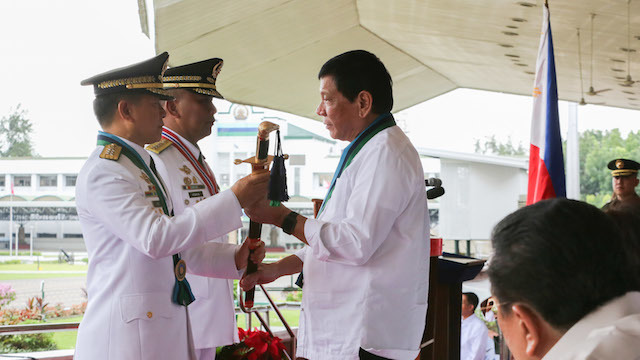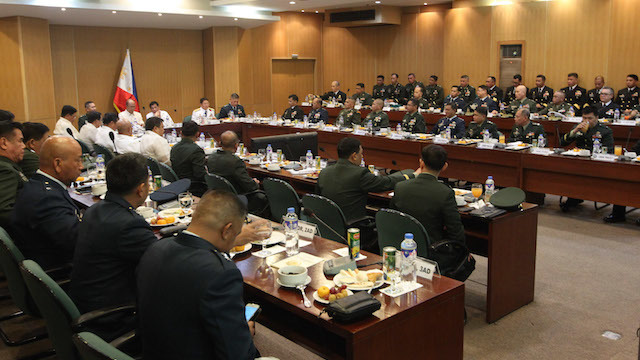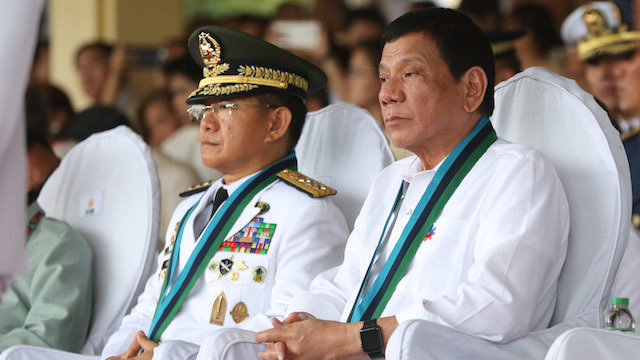Amid fears of creeping martial law, Armed Forces chief Eduardo Año could be the best person to protect democracy – or be its worst enemy

NEW AFP CHIEF. General Eduardo Año of the Philippine Military Academy (PMA) Matikas Class of 1983.
It was straight to the war room right after President Rodrigo Duterte led the change of command ceremony to install new Armed Forces chief General Eduardo Año on December 7.
The commander-in-chief told the military that he wanted to sustain the campaign against terrorism, particularly the Abu Sayyaf Group that is notorious globally for kidnapping foreign tourists, according to sources present at the command conference.
He was adamant that soldiers support his administration's peace talks with rebel organizations and make sure that ceasefires are not broken. The President also reiterated, of course, his call for the institution to support police operations against illegal drugs.
The 55-year-old Año leads the military as Duterte, who seeks to recalibrate ties with China and the US, shifts its focus back to counter-terrorism and away from the defense of the West Philippine Sea (South China Sea) that has been its rallying cry in the past administration. Newly acquired warships will now run after kidnappers in the Sulu seas and will no longer join US patrols of the disputed waters.
Año's plate is full. But what could potentially define his short term of 10 months is not his success or failure in these areas, but how he is going to lead the military as Duterte's heavy-handed methods are igniting memories of Martial Law.

WAR ROOM. President Rodrigo Duterte sits in a command conference attended by the commanding generals of all key posts in the military. Malacañang photo
Duterte's order to bury the late Philippine dictator Ferdinand Marcos at the Libingan ng Mga Bayani is the clincher for many, sparking protests nationwide and putting many among his allies – including the Philippine Left – in a tight spot.
Duterte's cries against supposed ouster plots are suspect, too, vis-a-vis statements from his own security officers who dismiss the capability of mentioned personalities to destabilize the state. Is the President creating an environment that could help him justify extreme measures?
Section 18, Article VII of the 1987 Constitution empowers the President, as commander-in-chief of the armed forces, to order the troops to suppress rebellion, suspend the writ of habeas corpus, and place the country under martial law.
Here is where Año's role comes in, because no commander-in-chief – should he be toying with the idea – would dare declare martial law without the military's full support.
Military: No easy explanation
Año – a veteran combat and intelligence officer – stands to be the best protector of democracy or its worst enemy.
Año commands 120,000-strong troops nationwide, an institution that has the organization, assets, mobility, and skills that a dictator can use or a people can rely on to immobilize an abusive ruler.
Yet, the Philippine military defies easy explanation. In the 1970s, it provided the backbone for a ruthless dictatorship that jailed and killed thousands of dissenters. In 1986, it withdrew support from its commander-in-chief and led a civilian-backed revolt that culminated in the EDSA People Power Revolution.
Dissatisified with succeeding governments, mutinous soldiers launched at least 7 coups which all failed. But ordered to crush the communists, the military under Arroyo, for example, wiped out pro-rebel villages and was linked to the extrajudicial killing of suspected guerrillas.
The most recent proof of how it can efficiently implement orders without asking questions is the secret burial of Marcos at the Libingan ng mga Bayani on November 18, 2016.
Tool for democracy or dictatorship?
Año is a powerful tool whom a dictator – if ever Duterte becomes one – could have. His spying skills should worry Duterte's critics. He's smart, he's methodical, he's beyond impulsive. He takes credit for the arrest of the once elusive Communist Party of the Philippines leader Benito Tiamzon, the fall of New People's Army (NPA) commander Leonardo Pitao alias Kumander Parago, and the arrest of retired Major Jovito Palparan.
Today, Año's class at the Philippine Military Academy (PMA) – the Matikas Class of 1983 – controls the entire institution.
His mistahs (PMA classmates) command all the major services – acting Army chief Lieutenant General Glorioso Miranda, Navy chief Vice Admiral Ronald Joseph Mercado, and Air Force chief Lieutenant General Edgar Fallorina.
The PMA Class of 1983 graduated in the same year when former senator Ninoy Aquino was assassinated. As young lieutenants, they were witness to the massive protests against Marcos, the corruption in and out of the barracks, and the upheaval that eventually led to his ouster in February 1986.
'Protector of the people and the state'

Duterte is wise to shower the military with attention, jumping from one camp to another to attend to their needs. He pinned medals on wounded soldiers, funded hospital upgrades, and raised their salaries. He's bringing Año to his foreign trips.
Upon his assumption, Rappler asked the new AFP chief for his message to Duterte's critics who fear a creeping martial law.
Año recited the military's role stated in the 1987 Constitution. "Kami bilang (We, as the) armed forces, meron naman kaming mandato (we have a mandate). 'Yan ay nasa batas (It is in the law). We are the protector of the people and protector of the state," Año said.
"Sa ngayon naman ang mga usaping martial law ay puro usap-usapan lamang. Wala naman talaga tayong basehan para sabihing ganoon (At this point, talk about the declaration of martial law is just loose talk. We really do not have any basis to say that it's going to be the case)," Año added.
Will Año allow the declaration of martial law? He smiled, showing discomfort with the question. "That is a question that I am not competent to answer," he said.
Martial Law is a dark past of the Philippine military. The organization has instituted reforms to protect itself from returning to it. And Año stands guard, at least for the next 10 months – a very long time under Duterte.
http://www.rappler.com/newsbreak/in-depth/155349-philippine-military-chief-challenge-duterte

No comments:
Post a Comment
Note: Only a member of this blog may post a comment.